Emirates Cargo Plane Slides Off Hong Kong Runway, Killing 2 Ground Crew

© Tyrone Siu/Reuters

© Tyrone Siu/Reuters

© Andrea Verdelli for The New York Times

 Getty Images
Getty ImagesMillions of Indians are celebrating Diwali, the festival of lights, one of Hinduism's most significant and widely observed festivals.
While lamps and firecrackers light up homes and streets during the festival, they also worsen air pollution - a problem especially pronounced in northern India, where winter months already bring poor air quality.
This year, the Supreme Court has permitted the sale and use of "green crackers" in the capital, Delhi, to help curb air pollution, ending a ban on crackers that has been in place since 2020.
"Green crackers" claim to emit 20–30% less pollution than traditional firecrackers, but critics doubt their actual effectiveness in protecting the environment.
In recent years, several states have restricted or banned firecrackers to combat rising air pollution, but the rules are often flouted, further worsening air quality in the days after Diwali.

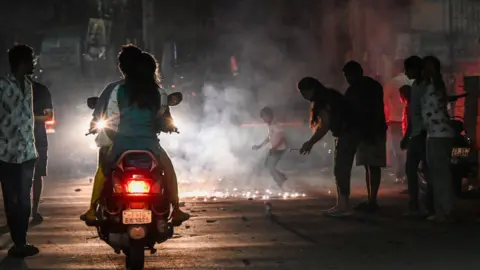 Getty Images
Getty Images
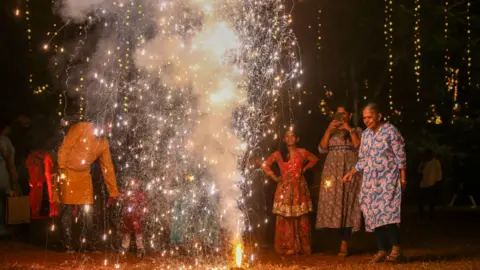 Reuters
Reuters
 Getty Images
Getty ImagesBut Diwali is about much more than fireworks. Food plays a central role in the celebrations.
Families prepare a variety of traditional Indian sweets which are shared with friends and neighbours. Festive meals often include rich curries, savoury snacks, and special breads.
In the days leading up to the festival, people clean and decorate their homes, shop for new clothes, and buy traditional sweets to exchange as gifts with friends and family.
Many also create traditional and colourful rangoli designs outside their doors to invite luck and positivity. On Diwali itself, families worship Lakshmi, the Hindu goddess of wealth.
Diwali's appeal goes beyond religion, drawing people from different communities and faiths to join in the celebrations.
Across India's cities and towns, markets bustle with shoppers buying sweets, gifts, decorations, and firecrackers, giving a significant boost to the economy each year.

 Debarchan Chatterjee/NurPhoto via Getty Images
Debarchan Chatterjee/NurPhoto via Getty Images
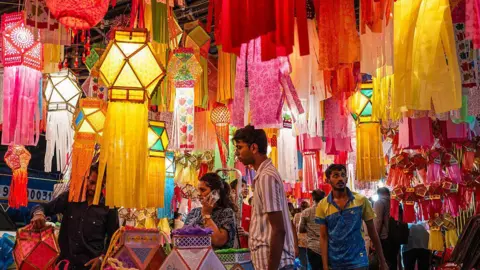 Getty Images
Getty Images
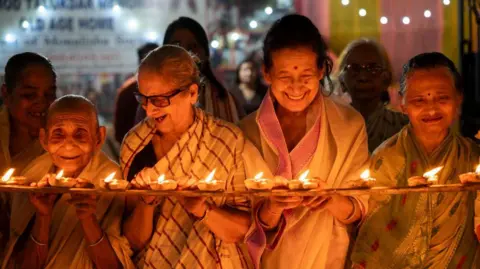 Getty Images
Getty Images
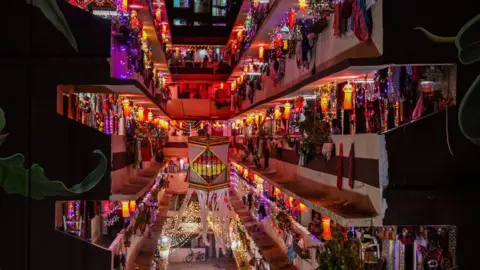 Getty Images
Getty Images
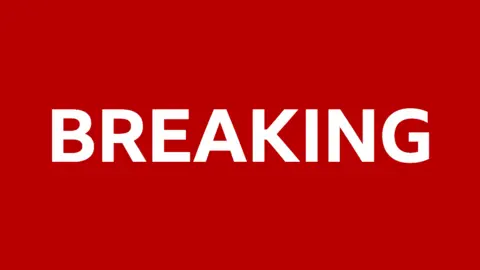 BBC
BBCA cargo plane has skidded off a runway at Hong Kong International Airport and landed in the sea, killing at least one person, local media have reported.
The Emirates flight, operating as Aerotranscargo, was arriving from Dubai just before 04:00 local time when it hit a vehicle on the north runway, local media reports.
Four crew members on board have been rescued and taken to hospital, but two ground staff "fell into the sea", a statement from the Civil Aviation department says. Their condition is unclear.
The affected runway is closed, but the airport's other two runways are still in operation.
This breaking news story is being updated and more details will be published shortly. Please refresh the page for the fullest version.
You can receive Breaking News on a smartphone or tablet via the BBC News App. You can also follow @BBCBreaking on X to get the latest alerts.

 Tony Jolliffe/BBC News
Tony Jolliffe/BBC NewsShe's a Hollywood A-lister, with a mantelpiece groaning under the weight of awards. But Cate Blanchett has taken an unexpected diversion from her day job - to immerse herself in the world of the humble seed.
Her eyes light up as she enthuses about the banksia species from her native Australia.
"It's quite a brutal looking seed pod that only releases its seed in extremely high temperatures," she tells us.
"It does look like a cross between a mallet and a toilet brush. So they're not always pretty, but yet what comes out of them is so spectacular."

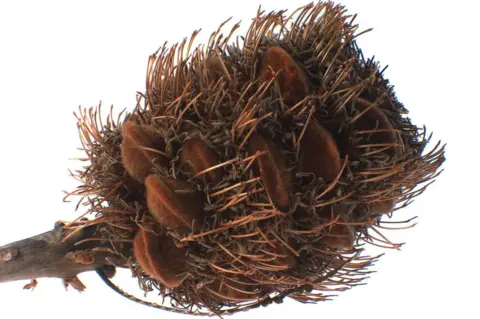 RBG Kew
RBG KewWe meet her at Kew's Millennium Seed Bank (MSB) at Wakehurst botanic garden in Sussex. She lives locally and teamed up with the project as it celebrates its 25th anniversary.
"Really, I stumbled upon Wakehurst. I was just in awe of the landscape and I always feel regenerated by being in the natural world," she says.
"And then I discovered the seed bank, and I literally had my mind blown by the work that goes on here… and I thought, anything I can do to be connected to it - I found it so inspiring."
The MSB is home to more than 2.5 billion seeds collected from 40,000 wild plant species around the world.
The seeds, which come in every shape, size and colour, are carefully processed, dried and then stored in freezers at a chilly -20C.

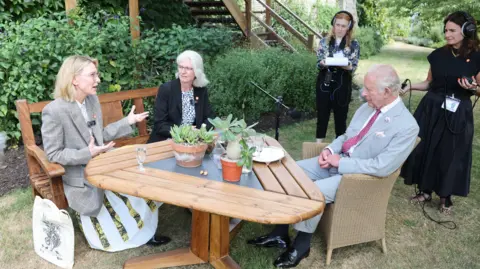 RBG Kew
RBG KewThe conservation project was opened by The King - then the Prince of Wales - in 2000. He's taken part in a special episode of a Kew podcast about the project called Unearthed: The Need For Seeds with Cate Blanchett.
In the recording he talks about his concerns that many plant species are being lost.
"I know how absolutely critical it all is, and the destruction of rainforests, the extinction of endless species, which have very likely remarkable properties," he tells the podcast.
When the seed bank first opened, it was seen as a doomsday vault - a back-up store of seeds to safeguard wild plants from extinction.
But 25 years on, the collection is being used for a different purpose: to restore environments that are under threat.

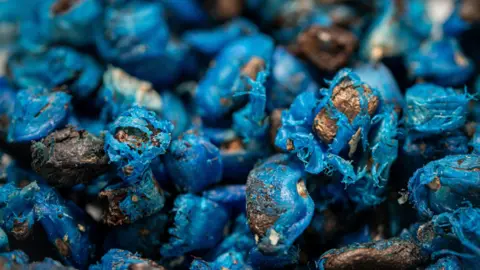 Tony Jolliffe/BBC News
Tony Jolliffe/BBC News"We want those seeds to be back out in the landscape," explained Dr Elinor Breman from the MSB, who's been showing Cate Blanchett the team's work.
"We're just providing a safe space for them until we can get them back out into a habitat where they can thrive and survive."
This includes projects like one taking place on the South Downs. A special mix of seeds from the MSB are being sewn to help restore the rare chalk grasslands there.
And this restoration work is being repeated around the world.
"We've been to every kind of habitat, from sea level to about 5,000m, and from pole to pole - literally," explained Dr Breman.
"And we're involved in restoring tropical forest, dry deciduous forest, grassland, steppe - you name it - we're trying to help people put those plants back in place."

 Kevin Church/BBC News
Kevin Church/BBC NewsThe seed bank also helped to restore plants after intense wildfires swept across Australia in 2019. Cate Blanchett says this meant a lot to her.
"There are almost 9,000 species of Australian plant that are stored [at the MSB]. And we know that bushfires are getting increasingly more intense. And it's sad to say - but knowing that insurance policy exists, is of great solace to me."
Working as an ambassador for Wakehurst has meant that the actor has had a chance to get hands on with the seeds.
"Have I got dirt under my fingernails? Well, I'm trying to turn my brown thumbs green," she laughs.
"You know, living in Sussex, you can't not but become a passionate gardener. So I've had a lot of questions about how one stores seeds as a lay person, and I've learned a lot about that. My seed management has definitely, definitely improved."
And after spending so much time with the researchers at the MSB, is she at all tempted to swap the film set for the lab?
"I wish I had the skill - maybe I could play a scientist," she laughs.
Cate Blanchett describes the seed bank as the UK's best kept secret - and believes that over the next 25 years its work will continue to grow in importance.
"You often think, where are the good news stories? And we're actually sitting inside one," she tells us.
"You come here, you visit the seed bank, you walk through such a biodiverse landscape, and you leave uplifted. You know change is possible and it's happening."

Bloomfield Stadium in Tel Aviv was filled with smoke before the scheduled kick-off
The Israeli Premier League derby between Maccabi Tel Aviv and Hapoel Tel Aviv was cancelled before kick-off on Sunday, after what police described as "public disorder and violent riots".
"Dozens of smoke grenades and pyrotechnic devices were thrown," Israeli police posted on X, adding "this is not a football game, this is disorder and serious violence".
Twelve civilians and three officers were injured, police said, while nine people were arrested and 16 detained for questioning.
The unrest comes just days after officials in the UK said that Maccabi Tel Aviv fans should not be allowed to attend the Europa League match at Aston Villa in England next month because of safety concerns.
Hapoel Tel Aviv criticised the derby cancellation, accusing Israeli police of "preparing for a war, not a sporting event", including during discussions in the lead-up to the highly-anticipated match.
"The shocking events outside the stadium and following the reckless and scandalous decision not to hold the match only demonstrate that the Israel Police has taken control of the sport," Hapoel Tel Aviv said in a statement on X, external.
Maccabi Tel Aviv has not yet commented, except to confirm the match was cancelled.
The decision by Birmingham's Safety Advisory Group (SAG) to ban Maccabi Tel Aviv fans from the Aston Villa match on 6 November has sparked widespread criticism.
The UK government has since said it is working to overturn the ban and exploring what additional resources might be required to ensure the fixture can be hosted safely.
Villa told their matchday stewards that they did not have to work at the game, saying they understood that some "may have concerns".
On Thursday, West Midlands Police said it supported the ban and classified the fixture as "high risk" based on intelligence and previous incidents.
That included "violent clashes and hate-crime offences" between Ajax and Maccabi Tel Aviv fans before a match in Amsterdam in November 2024, when more than 60 people were arrested.
There have been protests at various sporting events over the war in Gaza, including when Israel played Norway and Italy in recent football World Cup qualifiers.



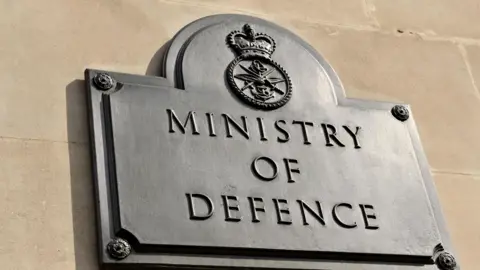 PA Media
PA MediaThe Ministry of Defence (MoD) is investigating claims Russian hackers stole hundreds of sensitive military documents and published them on the dark web.
The Mail on Sunday first reported the files on the dark web - an area of internet that can only be accessed through particular software - hold details of eight RAF and Royal Navy bases as well as MoD staff names and emails.
Maintenance and construction contractor Dodd Group confirmed it suffered a ransomware incident and it was taking the claims "extremely seriously".
The MoD said in a statement it was "actively investigating the claims that information relating to the MoD has been published on the dark web".
"To safeguard sensitive operational information, we will not comment any further on the details," it added in a statement.
The Mail on Sunday reported the documents hold information about a number of sensitive RAF and Navy bases, including RAF Lakenheath in Suffolk, where the US Air Force's F-35 jets are based.
A Dodd Group spokesperson said: "We can confirm that the Dodd Group recently experienced a ransomware incident whereby an unauthorised third-party gained temporary access to part of our internal systems.
"We took immediate steps to contain the incident, swiftly secure our systems and engaged a specialist IT forensic firm to investigate what happened.
"We are taking these claims extremely seriously and are working hard to validate this."
The hacks follow a series of high-profile data breaches at the MoD.
In August it was revealed thousands of Afghans brought to safety in the UK had their personal data exposed after an MoD sub-contractor suffered a data breach.
Last year the personal information of an unknown number of serving UK military personnel was accessed in a significant data breach.













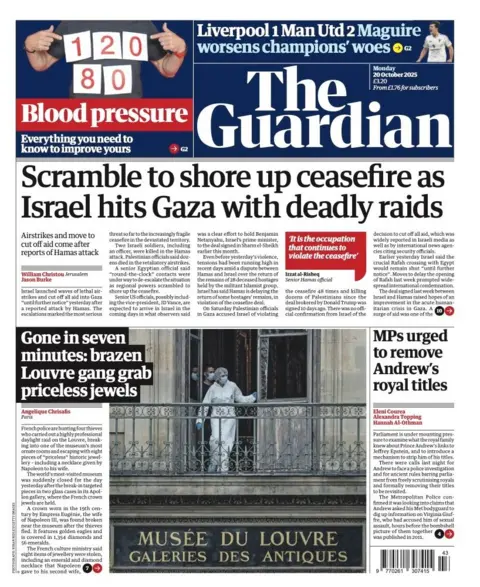

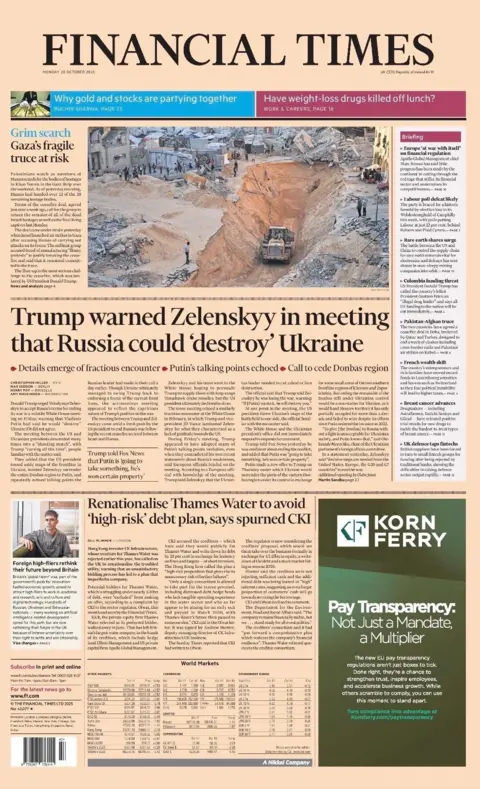

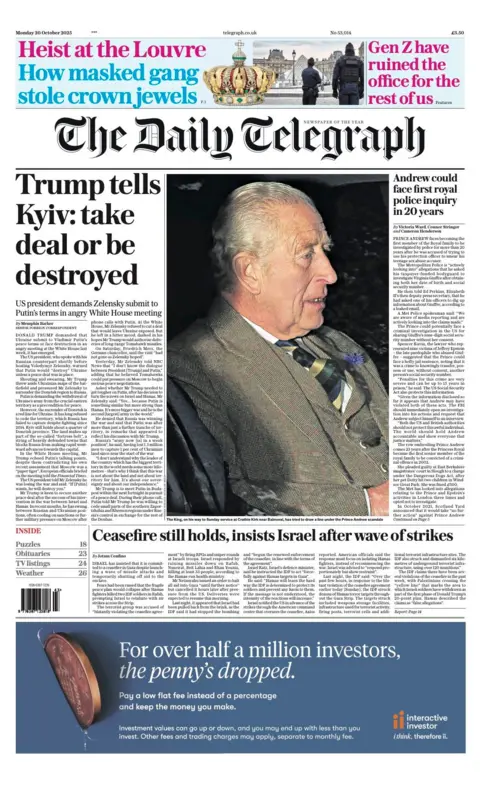

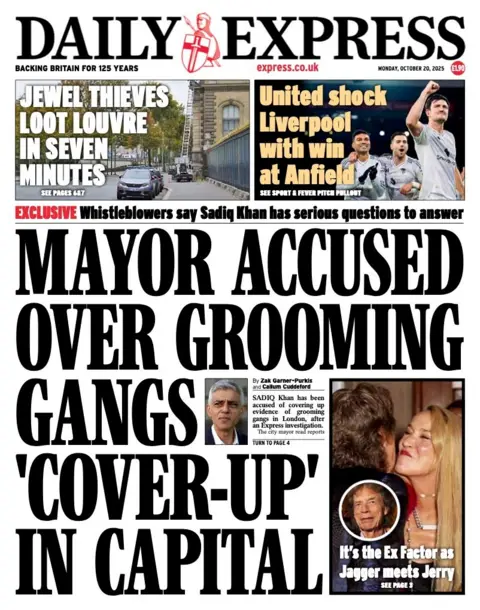




Sign up for our morning newsletter and get BBC News in your inbox.



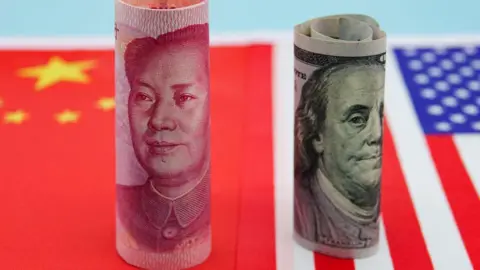 Getty Images
Getty ImagesThere is an eerie emptiness at the seat of US economic power.
The US Treasury is in shutdown like much of the federal government.
Most staff are furloughed as the world's finance ministers and bankers jet in for the International Monetary Fund annual meetings a few blocks away, their delayed flights handled by a small number of unpaid air traffic controllers.
There is, however, one clear message the Trump administration is notably keen to get out, not so much for its domestic audience but for the bewildered world outside.
And they delivered it in the middle of last week to a small number of people ushered into the Treasury and what is said to be the finest room in Washington DC, the ornate and marbled Cash Room, which hosted the inaugural reception for post-civil war president, Ulysses Grant.
"Make no mistake," said Treasury Secretary Scott Bessent alongside Trade Ambassador Jamieson Greer, as they fired the latest salvo in the ongoing 2025 global trade war. "This is China versus the world."
This simple message connects several extraordinary economic currents swirling around the world right now.

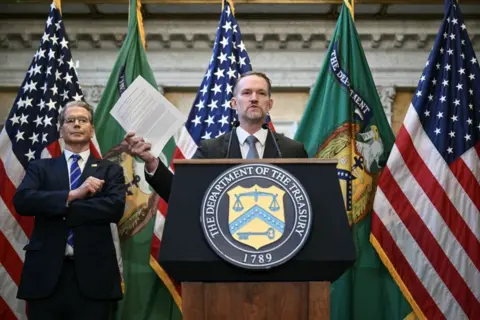 Getty Images
Getty ImagesThey include China's new export controls on critical minerals, fears of an AI bubble bursting, the tariff chaos and even the development of an erotic chatbot by OpenAI.
The world always seems to tilt a little on its axis in the two weeks a year that top bankers and finance ministers mass in Washington DC for their meetings at the IMF.
It is rare that the host itself is the main source of upheaval. Normally it would be a developing country, or perhaps the eurozone in the 2010s and infamously the UK in 2022.
The decisions and uncertainty arising from US trade policy, dizzying markets and decisions over its interest rates, loom large.
The inescapable signal being sent by the two most powerful US trade negotiators as they spoke to a small group of media in the Treasury's Cash Room was that China last week fired perhaps its most potent weapon yet by dramatically increasing restrictions on the trade of rare earth components.
These are critical to the production of high-tech goods ranging from electric cars to military hardware.
Bessent called the move a "Chinese chokehold" on the world.
China's "sweeping expansion" of export controls on rare earth elements and equipment, as well as electric vehicle battery tech, industrial diamonds and super hard materials is "an exercise in economic coercion on every country in the world", said Greer.
This accusation is being made as his own boss, President Donald Trump, attempts to redraw global trade relations by using tariffs to eliminate US trade deficits.
He may have produced what is the toughest tariffs system the world has seen since 1933 but the disruption it has caused has been surprisingly muted so far.
The biggest economy on the planet is now behind a significant tariff wall but it's yet to feel the impact, partly thanks to a wealth boom built on some rather frothy tech valuations.
The conclusion to take from that is either the world economy is more shock absorbent than thought or it is just a matter of timing, with the real pain ahead.

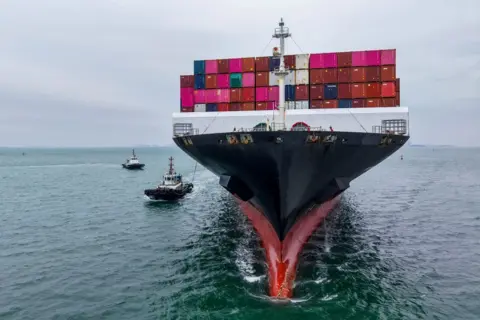 Getty Images
Getty ImagesCompanies exporting to the US have swallowed the cost of tariffs, which are effectively import taxes, in their profit margins. But is that only for the time being?
The wall of tariffs that the US has built around its economy has led to more trade, for example, from China to Europe and Africa.
The US itself has been protected, for now, from the profound uncertainties, higher prices and domestic living standards impacts of the tariffs and the 10% fall in the value of the dollar.
Some insulation has come from booming AI tech sector share valuations, creating a profound wealth effect in certain households across the US, calculated by JP Morgan economists as worth $180bn per year.
The thin line between boom and bubble is impossible to calculate. Sometimes, it can be felt.
I was standing outside the Nasdaq in New York's Times Square, where the high tech market which symbolises US private sector tech ascendancy publicises its latest IPOs (stock launches) to the world.
One of the dozens of funds which raises real cash to plough into crypto, joyously "rang the opening bell", despite their share price already having slumped.
The executives then filed out into the Square to watch a giant video of themselves ringing the bell, among confused tourists. In fact, inside the Nasdaq, there is no bell, or trading floor either, just a bank of futuristic screens. Is it just hubris?
Another screen reminds us it is the 20th anniversary of the Nasdaq flotation of another tech company which went public here, now worth $3tn, Google.
This week, OpenAI's Sam Altman revealed that ChatGPT was developing chatbot erotica options.

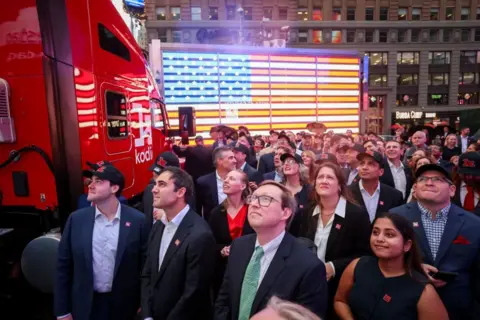 Getty Images
Getty ImagesThis comes at a time when analysts are taking a hard look at firms like Altman's which have emerged at the front of the pack in the AI race.
A raft of convoluted deals where major US firms including chipmakers are investing in their own suppliers and vice versa has raised eyebrows further about the potential that the billions being poured into data centres, AI start-ups and cutting-edge manufacturing plants could be fuelling an ever-growing bubble.
So are the Chinese trying to weaponise these fears that it's all about to burst?
This is what Jamieson Greer seemed to suggest when he said the Chinese export controls on minerals critical to many important semiconductors gives Beijing control over the entire global economy and the technology supply chain which powers the very firms that could be keeping the US economy afloat.
"This will impact artificial intelligence systems and high tech products," he said.
Bessent also joined in, saying US media reports that China was playing hardball and was prepared to use financial markets to hurt the US was like "taking dictation" from the Chinese communist party. He went on, unusually, to accuse a named Chinese negotiator of going rogue.
None of this seems like a game of chess.
This is not carefully considered maestros thinking out their strategies, six moves ahead of time. This is more like playing pool by smashing the balls indiscriminately around the table, and then attempting to break the cue, or the table, or both.
Tariffs, counter-tariffs and export controls amount to mutually assured destruction manoeuvres which are cloaked behind the general assumption that President Trump will always pull back from the brink. The more that is baked in, the higher the risk of a shock.
In this situation, it is sensible game theory to look for allies.

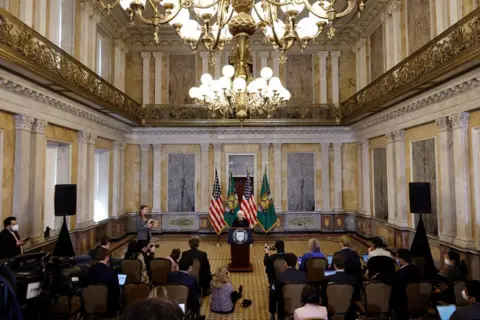 Getty Images
Getty ImagesThe China moves would affect the whole world, including Europe. UK Chancellor Rachel Reeves and other leading European finance ministers told me they would work with global partners to ensure the supply of these rare earth materials.
Reeves pointed to work with Canada especially on developing alternative supply chains. The US is now reopening mines, and refining facilities. Chinese dominance here is decades in the making, however.
At times like this, it is also fair to say there is some divergence between the public words of diplomacy and what is being said in private.
There was frustration and bafflement behind the scenes directed at the US for having liberally sprayed tariffs in all directions while asking the world to focus on China's trade distortions.
"It's hard to tell friend from foe," said one G20 finance minister.
"The Americans are basically trying to corral the rest of the world against China, using everything as leverage against China," one senior G7 official told me.
This climate of suspicion breeds uncertainty and the world's smaller central banks are ploughing their money into the so-called safe haven of gold for a reason, sending it to new records.
Back at the US Treasury Cash Room, where there is a lot of gold detail in the seven types of marble, there is another telling statement from US Treasury Secretary Bessent.
He sees the US going through a 1990s-style high-tech productivity boom. "That's the most analogous period to what we're seeing now."
In the coming weeks he will help choose the new chair of the US Federal Reserve in the mould of 1990s Alan Greenspan, who famously accommodated the run-up of the dotcom boom with low interest rates, considered by some to have contributed to the financial crash. Bessent has been rereading Greenspan's biography Maestro.
But in the 1990s the world's second biggest economy was not taking steps to interrupt the new tech supply chain and there was not a constantly rolling threat of more tariffs from China and the US.
These are centrifugal forces shaping the uneasy calm in the world economy.
The Road Runner moment has happened. Like the cartoon character, having headed off the edge of a cliff, global trade is defying gravity momentarily but the running has kept going, and even sped up.
The world's finance ministers on their field trip to Washington have had to assume the world economy will muddle through this.
It doesn't mean it will.

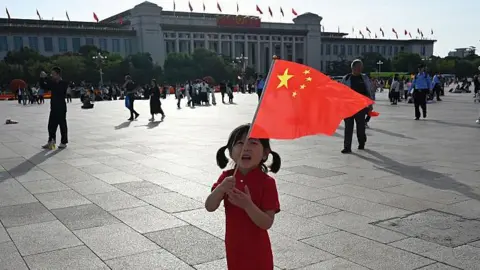 AFP via Getty Images
AFP via Getty ImagesChina's top leaders are gathering in Beijing this week to decide on the country's key goals and aspirations for the rest of the decade.
Every year or so, the country's highest political body, the Central Committee of the Chinese Communist Party, convenes for a week of meetings, also known as a Plenum.
What it decides at this one will eventually form the basis of China's next Five Year Plan - the blueprint that the world's second largest economy will follow between 2026 and 2030.
The full plan won't come until next year, but officials are likely to hint at its contents on Wednesday and have previously given more details within a week of that.
"Western policy works on election cycles, but Chinese policy making operates on planning cycles," says Neil Thomas, a fellow in Chinese politics at the Asia Society Policy Institute.
"Five Year Plans spell out what China wants to achieve, signal the direction the leadership wants to go in and move the resources of the state towards these predefined conclusions," he adds.
On the surface, the idea of hundreds of suited bureaucrats shaking hands and drawing up plans may appear drab - but history tells us that what they decide often has huge repercussions for the world.
Here are three times China's Five Year Plan reshaped the global economy.
Pinpointing exactly when China began its journey to become an economic powerhouse is difficult, but many in the Party like to say it was on 18 December 1978.
For nearly three decades, China's economy had been rigidly controlled by the state. But Soviet-style central planning had failed to lift prosperity and many were still struggling in poverty.
The country was still recovering from Mao Zedong's devastating rule. The Great Leap Forward and the Cultural Revolution - campaigns led by Communist China's founder to reshape the nation's economy and society - resulted in millions of deaths.
Speaking at the 11th Committee's Third Plenum in Beijing, the country's new leader Deng Xiaoping declared that it was time to embrace some elements of the free market.
His policy of "reform and opening up" became integral to the next Five Year Plan, which began in 1981.
The creation of free trading Special Economic Zones - and the foreign investment they attracted - transformed the lives of people in China.

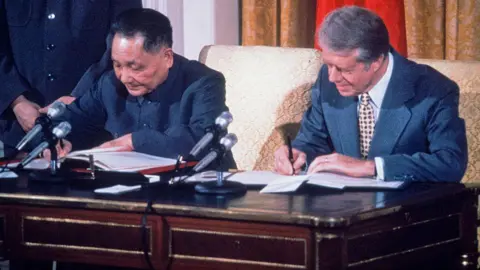 Getty Images
Getty ImagesAccording to Mr Thomas, the aims of that Five Year Plan could not have been achieved more emphatically.
"China today is beyond the wildest dreams of people in the 1970s," he says. "In terms of restoring national pride as well as establishing its place amongst the great powers of the world," he says.
But it also fundamentally reshaped the global economy. By the 21st Century, millions of western manufacturing jobs had been outsourced to new factories in China's coastal regions.
Economists have called this "the China shock" and it's been one of the driving forces behind the rise of populist parties in former industrial parts of Europe and the United States.
For example, Donald Trump's economic policies - his tariffs and trade wars - are designed to bring back the American manufacturing jobs lost to China over the previous few decades.
China's status as the workshop of the world was cemented once it joined the World Trade Organization in 2001. But at the turn of the century, the Communist Party leadership was already planning its next move.
It was wary of China falling into the so-called "middle income trap". This happens when an upwardly mobile country can't offer ultra-low wages anymore, but at the same time doesn't have the innovative capacity to create the high-end goods and services of an advanced economy.
So instead of just cheap manufacturing, China needed to find what it called "strategic emerging industries" - a term first officially used in 2010. For China's leaders, this meant green technology, such as electric vehicles (EVs) and solar panels.
As climate change became increasingly important in Western politics, China mobilised an unprecedented amount of resources into these new industries.
Today, China is not only the undisputed world leader in renewables and EVs, it also has a near monopoly over the rare earth supply chains needed to build them.
China's stranglehold on these key resources - which are also crucial to chip-making and artificial intelligence (AI) - now puts it in a powerful position globally.
So much so that Beijing's recent move to tighten export controls on rare earths was labelled by Trump as an attempt to "hold the world captive".
Although "strategic emerging forces" was enshrined in the next Five Year Plan in 2011, green technology had been identified as a potential engine of growth and geopolitical power by China's then leader Hu Jintao in the early 2000s.
"This desire for China to be more self-reliant in its economy, in its technology, in its freedom of action, goes back a long way - it is part of the fibre of Chinese Communist Party ideology," explains Neil Thomas.
This may explain why China's Five Year Plans more recently have turned their attention to "high quality development", formally introduced by Xi Jinping in 2017.
This means challenging American dominance in technology and putting China at the forefront of the sector.
Domestic success stories such as the video sharing app TikTok, telecommunications giant Huawei and even DeepSeek, the AI model, are all testament to China's technological boom this century.
But western countries increasingly see this as a threat to their national security. The subsequent bans or attempted bans on popular Chinese technology have affected millions of internet users around the world and have sparked bitter diplomatic rows.

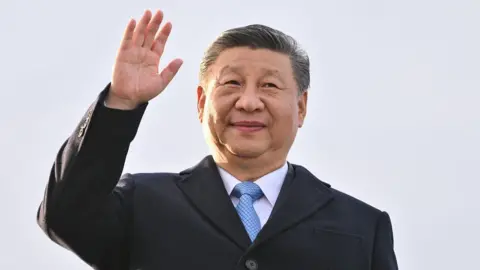 Grigory Sysoev/RIA Novosti/Pool/Anadolu via Getty Images
Grigory Sysoev/RIA Novosti/Pool/Anadolu via Getty ImagesUntil now, China has powered its tech success using American innovation, such as Nvidia's advanced semiconductors.
Given their sale to China has now been blocked by Washington, expect "high quality development" to morph into "new quality productive forces" - a fresh slogan introduced by Xi in 2023, which tilts the focus more towards domestic pride and national security.
This means putting China at the cutting edge of chip-making, computing and AI - not reliant on Western technology and immune to embargoes.
Self-sufficiency in all areas, especially at the very top end of innovation, is likely to be one of the central tenets of the next Five Year Plan.
"National security and technological independence are now the defining mission of China's economic policy," Mr Thomas explains.
"Again, it goes back to that nationalist project that underpins communism in China, to ensure it never again is dominated by foreign countries".

一架阿联酋货机在抵达香港国际机场时发生事故,造成两人死亡。
综合网媒“香港01”、香港《星岛日报》和香港电台等报道,一架阿联酋货机星期一(10月20日)凌晨约3时50分在降落香港国际机场北跑道后出现偏离情况,滑出海面。事故过程中有一辆地勤车被撞,车上两人落海失踪,随后被救起,其中一人当场证实死亡,另一人送往北大屿山医院时处于昏迷状态,经抢救后不治。
涉事货机航班编号UAE9788,为阿联酋航空货运航班,由土耳其为总部的AIR ACT代为执飞。这架货机是波音747-481(BDSF)机型,注册编号为TC-ACF。货机机头搁在岸边、机身折断浮在海中,机尾不知去向。
香港民航处说,香港国际机场星期一凌晨约3时50分发生一起事故。一架由阿联酋阿勒马克图姆国际机场抵港的B744货机(航班编号UAE9788),在北跑道降落后出现偏离情况滑出海面。空管人员已即时按既定机制,通知机场管理局及其他救援单位。
民航处称,初步资料显示,机上四名机组人员已获救送院,另两名地勤工作人员受事故影响落海。北跑道因事件关闭,南跑道及中跑道将继续维持运作。
民航处表示,高度关注这起事件,正与有关机场单位包括相关航空公司跟进,并已根据既定程序将有关情况通报民航意外调查机构,全力配合调查事故成因。
香港运输及物流局对机场货机事故深表关注,并称对有人在事故中离世表示难过。
香港机场管理局将在星期一上午时10时会见媒体,交代最新情况。
中共总书记习近平星期天(10月19日)致电郑丽文,祝贺她当选国民党主席。国民党立法院党团总召傅崐萁表示乐见其成,强调两岸和平是全民期待,也是台湾经济发展的定海神针;两岸要打开活路,绝不能走进死胡同。
国民党上星期六(18日)完成党主席选举,国民党中央星期天午间收到中共中央总书记习近平发来贺电。据新华社报道,习近平在贺电中表示,多年来两党在坚持“九二共识”、反对“台独”共同政治基础上,推动两岸交流合作,致力维护台海和平稳定,增进两岸同胞亲情福祉,成效积极。
另据国民党发新闻稿,郑丽文已回复电文致谢。她在电文中表示,海峡两岸于1992年达成“各自以口头方式表达坚持一个中国原则”的共识。国共两党在坚持九二共识、反对台独的共同政治基础上,推动两岸关系和平发展,取得诸多历史性成就,殊为不易。
联合新闻网引述傅崐萁星期天表示,两岸和平是台湾全民的共同期待,也是台湾经济发展的定海神针。因此不论是“九二共识”,还是依照“中华民国宪法的一中”,或是其它两岸可以接受的、以和平基础进行的对话,都该努力、追求及探讨。
傅崐萁指出,他对习近平的贺电是乐观其成,更期待两岸有更高共识,能和平发展,在“异中求同”,这也是每一位政治工作者都应该努力达成的,台湾需要安定幸福发展。
傅崐萁过去努力争取两岸观光、经贸交流等,国民党团就此会否有新规划?傅崐萁认为,交流不能中断,因为两岸没有接触,就容易有误会、摩擦,和平是台湾人民最高福祉所在,再大困难,都要想办法突破,彼此磨合。
他指出,有机会当然会持续进行两岸交流,绝不能让两岸走进死胡同,不管是哪一种政治信仰,都应该这样,两岸要打开活路,努力去做。
中国驻伦敦旅游办事处主任张力说,2025年中英旅游交流正迎来全面回暖,并预计英国居民赴华旅游将在今年提前恢复至疫情前水平,早于之前预测的2026年。
据中新社报道,张力星期天(10月19日)受访时说,英国居民赴华旅游复苏强劲,航线运力持续增强。
截至今年8月,中英间共有21条直航航线,连接伦敦、曼彻斯特、爱丁堡与北京、上海、广州等11座中国城市,每周往返航班228班次,比2019年增长35%。他说,无论是航班数量还是恢复比例,中英航线均已位居欧洲各国赴华航线之首。
同时,中国驻伦敦旅游办今年以来已组织八批赴华踩线活动,共有143位英国主流旅行商、旅游作家等赴贵州、广西、西藏等地考察,进一步拓展英国赴华旅游市场,提升了中国在英国旅游业界的影响力。
张力还说,目前英国有30余家组团社在经营赴华旅游产品,覆盖全英上千家分销商网络。
此外,英国学生赴华研学市场持续升温。张力说,随着中国科技创新和产业发展水平的提升,越来越多国际研学机构组织学生赴华参访交流,走进科大讯飞、比亚迪、大疆、华为等企业,“感受中国在人工智能、制造业及新能源等领域的最新成果,将科技交流与研学旅行深度融合,形成新的市场增长点”。
随着中美科技战下围绕安世半导体的争议持续延烧,安世半导体东莞工厂已限制出货,并计划实施“上四休三”工作制(四天工作日)。
据《每日经济新闻》报道,上述工厂自中国国庆中秋长假之后已限制出货,并计划自下周起实施“上四休三”工作制;同时有贸易商确认,产品面临缺货与涨价压力。
公开信息显示,位于东莞黄江镇的安世半导体工厂是安世半导体旗下最大的封装测试基地,占地约10万平方米,员工约4000人。
上星期六(10月18日),工厂门外已有部分贸易商及客户聚集。两位从苏州连夜赶来的客户说,他们上星期五(17日)凌晨就已抵达工厂。“我们坐高铁过来,在南昌转的车,也有1000多公里了,晚上九点多一下火车就赶过来了,就说‘我们是客户,过来提货的’,但也没办法,就是没货。”
他们还透露,厂方仅以“这个情况我们也没办法”等回应,未给出明确说法。
另一位从深圳赶来的贸易商也提到,公司已派员连日蹲守,“没办法,得给客户一个交代,在现场掌握的信息更多些”。他判断,工厂停止出货已超过一周,但生产似未完全停止。
安世半导体的母公司闻泰科技对外回应称,中国区正展开“独立自救”,紧急拉通国内供应链以保障客户需求。
荷兰政府上月底以安世内部有严重治理缺陷,关键技术存在被转移至中国母公司闻泰科技的风险为由,接管了这家欧洲晶片制造商;此举也引发中国政府禁止出口安世半导体的产品。法院文件显示,美国曾警告安世,须更换中国籍首席执行官,以避免被列入制裁名单。

© Doug Mills/The New York Times



CDT编者按:10月18日,柴静的 YouTube 频道发布了题为《江青如何谈毛泽东,林彪,贺子珍与党内斗争?》的节目,以美国学者维克特(Roxane Witke)1977年出版的著作《江青同志》(Comrade Chiang Ching)为切入,结合了中外亲历者回忆及公开档案、媒体报道,重构这段影响中国现代政治史的口述纪录。
1972年,江青与美国学者维特克进行了长达60小时的访谈。在毛泽东健康衰退、林彪事件刚过、权力交接在即的微妙时刻,江青试图效仿斯诺(Edgar Snow)采访毛泽东的先例,主动寻求维特克为自己立传,以期获得国际舆论支持,巩固其政治地位。在访谈中,江青极力塑造自己作为毛泽东“哨兵”和文革关键角色的形象,详述了她如何启发并协助毛泽东发动历次政治运动,同时花费大量篇幅攻击林彪,并夹带私货、贬损毛的前妻贺子珍,试图重塑自己备受争议的上海历史。然而,这次访谈也暴露了她的政治野心、对权力的操纵欲以及对党内高层(如周恩来)的轻蔑;她无视规则泄露了包括军事地图在内的敏感信息。
维特克在这场充满压力、被形容为“需要驱魔”的访谈中,既被江青的权力魅力所迷惑,也记录下了她的偏执和脆弱。最终,这次访谈适得其反,其内容(及衍生的《红都女皇》传闻)成为毛泽东与她政治切割的因素之一,并在她倒台后,成为指控她“泄密”和“攻击毛主席”的罪证。《纽约时报》称:“毛泽东妻子因向美国学者泄密而遭到主席严厉批评。” 60小时口述里,江青谈到:她是否介入毛泽东婚姻?政治局是否对她存在“约法三章”?如何与林彪,彭德怀,刘少奇斗争?并说“性在最初让人着迷,但长久有吸引力的是权力。”

今天照例来得罪人了。
最近咱们为诺贝尔奖的事吵起来了。有媒体说不稀罕“洋奖”,也有人表示反对。
平心而论,日本人拿得确实有点多,本世纪已经22个了。但咱也不至于吵起来嘛。好比隔壁孩子拿了奖,你家里反倒吵起来了,多不好。
孩子拿不拿奖,未必体现什么;但没拿奖之后是什么反应,特别能看出一个家庭的成色。换句粗俗的说,床上不见人品,没上成床后的反应才见人品。
“呵……tui!丑货!”这就很不好了。
对于这个诺宝儿奖、或者说诺贝儿奖,作为一个读金庸的,我觉得最大关键,就是咱们事先得说好,不要变来变去。
这个奖到底是个好奖,还是个破奖?咱们到底想得,还是不想得?如果咱有人不小心得了,到底算是立功还是犯错误?这几点,媒体老师能不能先定下来,得有个章程嘛。
就像华山论剑,去和不去,原本都无所谓。丐帮去了,少林不去,都行,不丢人。就怕变来变去,还说什么最近秦岭老下雨,谁特么稀罕去华山啊,那就很不江湖。
比如在发奖之前,就可以先说好:这破奖咱明确拒绝,谁得谁是王八。
那多好,大家就都认识统一了,一起鄙视就完了呗。
年轻朋友有所不知,很多时候,咱们其实显得很想要这个奖。
多年来一直盛行这样的说法:诺贝尔文学奖,老舍本来可以得,鲁迅本来可以得,林语堂本来可以得,都是让出去了,或者是机缘不巧、失之交臂。
说得添油加醋、活灵活现。
前几天还有评论,叫《拉斯洛替李白拿到了诺贝尔文学奖》,你的奖不是你的,是你替我们祖宗拿的。
说白了不还是想得嘛。不想得的东西,谁会这样意淫呢?
此外,倘若咱不小心真得了,是立功还是犯错?也得先说好,不要老变。
有人可能不记得了,我却记得很清楚,因为我当时就在官媒工作。莫言得了,屠呦呦得了,当时都说是好事,一片祝贺,敲锣打鼓,当时的报道我不好去列举了,你们自己搜。吃瓜群雄们也个个与有荣焉,觉得脸上有光。
然而没过几年,群雄又调转头来骂,还要起诉人家得奖的。
要变卦早说啊,人家完全可以不领嘛。领了,你们沾光过了、自豪过了,等于撸完了,贤者时间了,转头又骂老师,这算是个什么嘛。
这玩意儿到底是荣誉,还是圈套?到底是自豪,还是自宫?事先说好成不,或者正义网民们搞一个《诺奖应对指南》,否则自豪起来都心虚。
再说说不稀罕“洋奖”这事。
洋奖到底要不要,也应该有个章程,还是那句话,咱能不能先说好。
世界杯、奥运会,都是洋奖,尤其奥运会,是古希腊发源的奖,可说是洋奖的祖宗。
并且我们现在很多人认定,古希腊根本就是不存在的,是个骗局,那就更不应该稀罕奥运了。一个假的古希腊,你还去传“圣火”,那不是中计了吗?
然而实际情况是,世界杯,咱们不但想踢,还想办;奥运会,次次下血本重氪,前一阵不是还流行去扒为谷爱凌夺牌花了多少多少钱么。
那么洋奖到底是稀罕还是不稀罕,给个准信啊。
看到有人反驳说,那一样么!奥运会是一个个拼出来的,诺奖是小圈子给出来的!意思是前者咱可以氪金,后者咱应该鄙视。
咦奥运会体操跳水、花滑花游、滑雪马术,不都是“小圈子”打分给出来的么。
而且怎么又成“拼出来的”了,不是说资本操控的么,不是说裁判把持的么,不是说吃药么,不是共济会光明会博彩公司插手么,不是说撒旦神秘祭祀仪式么,不是外国政治交易瓜分奖牌么,这会儿咋又成拼出来的了。
事先能否说好,什么时候承认是拼出来的,什么时候不承认是拼出来的,还是要一致啊。
盼诺奖,踩诺奖;想诺奖,喷诺奖;yy诺奖,鄙视诺奖;自豪得诺奖,起诉得诺奖……
又想又怕,又当又立,又卑又亢。
这些吃瓜群雄啊,没拿到时,说标准不公平,我们被排斥了;真拿到了,就怀疑中了计,我们被渗透了。
动作之乱、标准之无序,总给人一种马老师踩着滑板打五连鞭然后不小心触电了的既视感。
花钱能砸的,集训能训的,就拼命砸洋奖、冲洋奖;花钱砸不出的,集训训不了的,就说看轻洋奖、蔑视洋奖。
就想弱弱问一句:为什么奖拿得那么少,戏却那么多?
给自己加油很好,给自己加戏,就没什么意思了。
对了,这篇文不是我写的,是我一个朋友写的,我被他盗号了,我不知道怎么回事。

近日,广东省人大常委会颁布通过《广东省实施〈妇女权益保障法〉办法》,办法中明确规定,“夫妻一方持身份证、结婚证等证明夫妻关系的有效证件,依法向不动产登记、车辆管理单位申请查询另一方财产状况的,有关单位应当受理,并为其出具相应的书面材料”。
这一规定显然与去年引发热议的福建省人大常委会审议通过的《福建省妇女权益保障条例》形成鲜明对照,该条例规定的是,“妇女持身份证、户口本和结婚证等证明夫妻关系的有效证件,可以依法向房地产行政管理、车辆管理等单位申请查询配偶的财产状况,有关单位应当受理,并且为其出具相应的书面材料”。
从妻子可查询丈夫财产到夫妻可互查配偶财产,广东省的规定似乎是为了避免彼时福建省出台妻子可查询丈夫财产时所引发的有悖男女平等保护的舆情喧嚣。但是,福建省人大出台上述规定的用意也相当明显:在涉及离婚的家庭纠纷中,往往会出现一方对另一方的财产状况不明,而另一方借此隐藏、转移、变卖、挥霍共同财产的情形,由此就导致夫妻共同财产分割困难和弱势一方的财产损失。而在离婚诉讼的财产分割中,处于弱势的又常常是女性,所以,“妇女持有效证件可随时查询配偶财产”就成为对女性的特别保护。
值得注意的是,允许妻子查询丈夫财产的规定是写在“妇女权益保障条例”中,所以对女性施予特别保护的条文,并不能被理解为仅允许妻子可查询丈夫,却禁止丈夫查询妻子的财产,只是这一条仅为落实“妇女对夫妻共同财产享有知情权以及平等的占有、使用、收益和处分的权利”,其立法依据也在于《中华人民共和国妇女权益保障法》所规定的“国家保障妇女享有与男子平等的财产权利”“在夫妻共同财产、家庭共有财产关系中,不得侵害妇女依法享有的权益”。
但从上述条文的变化,仍旧可以看到女性权益保护中面临的难题:
一方面,《中华人民共和国宪法》和《中华人民共和国妇女权益保障法》都强调,“妇女在政治的、经济的、文化的、社会的和家庭的生活等各方面”都与男性平等。但此处的平等,若无国家促进义务的履行,本质仍旧只是形式意义上的平等。要使两性平等真正由形式成为实质,就必须借助国家在促进男女平等和消除歧视方面的积极作为。这种积极义务对于男女在规范意义上的平等当然是补充和强化,其对于矫正因为生理差异、社会评价、父权文化等诸多原因所导致的两性实质上的不平等而言,也无疑是重要且必须的。
另一方面,国家一旦积极介入,尤其是通过对女性的特殊保护来实现性别正义,就一定会遭遇可能造成新的不平等的诘问。此处的不平等,既有男性和女性之间的,也有女性和女性之间的。如此,立法者如何化解积极促进两性平等和不得因性别进行区别对待的矛盾,就成为两性平权叙事中的亘古难题。
再将上述问题放回到妻子可查询丈夫的财产规定上,立法者之所以设置这种“特别保护”,无疑就是为了矫正市场/家庭的二分结构下,女性因承担了大量繁杂却无法被市场量化和评价的家务劳动和照料劳动所导致的,不仅劳动和价值在很多时候都被漠视,一旦涉及离婚诉讼,女性利益还被贬损甚至是牺牲的现实。
所以,放在这个背景下,大致可以理解福建省此前规定的缘由和逻辑。与此前政府多次提出的“要建立生育支持政策体系,降低生育、养育、教育成本”一样,这种举措都是国家在市场和家庭的对立仍旧尖锐、家务劳动的价值未获充分重视的背景下,对家庭和两性关系的强制干预。这种干预除了确保可能处于弱势的女性在离婚诉讼中获得尽可能平等的财产分配外,同样赋予了女性日常对于配偶财产状况的知情权。
这种查询和知情,甚至反向提醒更多在市场中赚取财物的男性,其经济财富和社会地位的获得是建立在妻子更多家务付出的基础上,其赚取的市场财富当然属于夫妻共同财产,作为配偶的妻子也可平等地占有、使用、收益和处分。
福建省人大常委会的规定,尽管突出了对女性的特别保护,却也容易给人留下仅允许妻子查询丈夫,却不允许丈夫查询妻子的错误印象。故而,广东省人大常委会是直接规定夫妻双方可互查配偶财产,由此也避免了法律只保护女性,却未保护可能同样为家务付出更多,在离婚诉讼中同样会面临被剥削和压制命运的男性。
毕竟,尽管在更大比例上,是女性在家庭中承担了无法被市场估值和量化的家务劳动,也仍旧存在同样为家庭作出更多贡献的男性。由此,从福建省的妻子可查询丈夫财产,到广东省的夫妻双方可互查配偶财产,二者之间的差异可能并没有法条表述所呈现的那么明显,其本质都是国家对于家庭平等的干预、弱势一方权益的维护乃至对性别正义的矫正。
但有意思的是,《广东省实施〈妇女权益保障法〉办法》的这条位于该办法的第七章“婚姻家庭权益”,而非第六章“财产权益”。在“财产权益”一章,该办法甚至强调,“任何人不得因女方无劳动收入、劳动收入少或者其他理由,限制或者剥夺妇女依法享有的财产权利。对夫妻共同所有的不动产以及可以联名登记的动产,女方有权要求在权属证书上记载其姓名”。
既然没有被列入财产权益一章,而是列入婚姻家庭权益,说明本条的主要用意,除为保护女性在婚姻中的财产权益外,还旨在借由夫妻双方在婚姻存续期间对彼此财产状况的知情了解,来确保夫妻双方对于婚姻的忠诚持守义务。
然而,夫妻双方的忠诚义务本就属于杂糅了道德和法律双重色彩的模糊概念,其范围大致可包括夫妻双方在婚姻存续期间感情和性关系的专一性和排他性,以及夫妻双方不得恶意遗弃配偶,不得为第三人的利益牺牲和损害配偶的利益等,这种忠诚义务是否要延续至彼此财产状况的完全披露不无疑问。
因为即使是《中华人民共和国民法典》也仅规定,对配偶财产的查询只应用于双方进行离婚财产分割时。若在整个婚姻存续期间,都可允许夫妻双方随时互查,接受查询的机关也随时有义务为查询者出示查询结果,无疑会导致个人自由和隐私空间在婚姻制度下被无限挤压。这不仅不符合现代年轻人对婚姻关系的期待和想象,也可能会借法律之名形成对个人自主空间的抑制和束缚。
此外,若婚姻制度要彻底凌驾于个人的自由之上,甚至要通过国家干预和政府监督的方式,做到夫妻双方之间的时时披露和事事透明,这大概率又会成为年轻人新的“恐婚事由”。
故而,对这条的理解、宣传甚至是适用,还是应尽量限制在夫妻分居、离婚冷静期、离婚诉讼期以及婚姻关系被依法解除后,其目标也不能直接指向借由财产披露来达到婚姻忠诚,而是为避免在离婚财产分割时,一方通过隐藏、转移、变卖、毁损和挥霍夫妻共同财产来损害对方的财产利益。
要不要允许妻子查询丈夫的财产,甚至要不要允许夫妻之间随时互查,本质上又都关涉因市场/家庭的二分所导致的婚姻关系下的压制和不公。尽管社会观念一再强调“男女在家庭分工上可能各有不同,但贡献却都一样”,但毋庸置疑的是,家庭中市场财富的主要创造者总会在家庭生活中拥有更大的话语权,弱势一方也一定会遭遇更多的剥削和困境。
这种困境在面临离婚诉讼时会集中爆发,因为即使法院在进行财产分割时会考虑承担了更多家庭贡献的一方的利益,但这种泛化的“家庭贡献”也无法与明确的市场财富获得同等对待。所以,在离婚诉讼之前就允许夫妻对配偶的财产充分知情了解,可说是事后补救之外的事先预防。
但问题的关键是,这种事先知情就可以有效实现婚姻制度之下的性别正义吗?当进入婚姻就会面临有薪工作和照顾家庭的两难取舍,女性还要进入婚姻吗?再延伸下去,在女性已经开始广泛参与市场工作的前提下,又该如何维系家庭?
美国学者爱丽丝∙凯斯勒∙哈里斯在《妇女一直在工作》一书中揭露了一个事实:女性从过去到现在一直在工作,只是在较长时间内,这种工作非但未被量化和价值化,甚至都未进入法律所讨论的工作权的范畴,宗教观念和社会意识也总通过拔高和“美化”女性作为家庭道德守护者的方式,将女性牢固地束缚在家庭之内。但坚韧的生命力总会使很多女性逐步扩展工作边界,从作为母亲到作为社会管家,女性开始真正进入作为男性传统堡垒的市场。
随之而来的问题是,如果人类社会的工作模式就是按照养家糊口的父亲和全职在家的母亲量身定做,女性却已和男性一样笃信,工作就是所有人的生活必需品,那么在女性进入市场领域后,家庭又该如何维系?又有谁来承担照顾老人、病人和小孩的责任?渴望工作的女性会因此选择缩小家庭规模,甚至推迟生育,而有财富支持能力的家庭则是将家务和育儿都外包出去,但这不仅会导致其他形式的剥削发生,也会引发生育率的骤减和家庭作为社会最小单元的逐渐坍塌。
这些事实都说明,家庭和社会之间的紧张关系,并未伴随女性权利的提升和主体意识的觉醒而消弭,反而以更具张力的方式呈现。也正是在这个背景下,国家被更多地要求要对原本封闭的家庭关系进行介入和干预。
这种干预,既包含国家和社会对母亲的整体性托举,例如鼓励社会力量兴办托育服务机构,支持幼儿园、国有企业、机关事业单位提供普惠托育服务等,也包括允许女性查询配偶财产此类强硬的举措,而其目标又都是尽可能帮助女性超越家庭/市场、生产性/非生产性的二元框架,以及解决家庭责任和市场劳动的内在矛盾。
所以,从这个意义上说,尽管在上述查询配偶财产的法律规定中,都存在着婚姻中的夫妻忠诚义务是否可延伸至双方都需巨细靡遗地披露各自的财产隐私这一法律问题,但这些规定都表征出,国家在促进两性平等和提升家庭中的弱势群体方面的积极努力。
而其引发的舆论和质疑又在一定程度上说明,对性别正义的实现,可能并不能仅依赖于简单的性别扶贫或是禁止区别对待,而是应着眼于在更宏观的层面上改善女性在整体社会结构中所处的压迫性和屈从性地位,也改变“男性必须挣钱养家、女性必须照顾家庭”的传统观念。
或许只有在压制性地位被改变以及传统性别分工被颠覆后,外出挣钱和照顾家庭才会是男性和女性双方的自由选择,二者也真正能够在不牺牲任何一方的情况下并行不悖。
“三热爱”也要与时俱进一下吗?


© Illustration by Sam Whitney/The New York Times
(本文首发于南方人物周刊)
南方人物周刊特约撰稿 赵阡合
责任编辑:杨静茹

在2025年国庆档上映的新片当中,《震耳欲聋》是个亮眼的存在。题材方面,它关照聋人群体、聚焦反诈,既有人文关怀,又有热点话题;演员方面,它是流量小生檀健次主演的首部现实主义电影,备受粉丝关注;票房方面,它以小成本撬动大回报,先以3000万的成绩登上国庆档预售票房榜第一,上映后票房又持续走高,成为目前国庆档唯一确定盈利的影片;口碑方面,近19万豆瓣用户为它打出了7.4的评分,是近期新片中的口碑佼佼者。
作为一部中小体量作品,《震耳欲聋》无疑算得上一匹黑马。然而,尽管反响不错,但它并未像《我不是药神》那样形成现象级的口碑效应。两部影片都关注弱势群体,都展现了主角的人物弧光,甚至主角都是有灰度的。但相较而言,《我不是药神》兼顾了人物和故事,主角之外的几个配角也都有血有肉、面目清晰,嵌套在故事的起承转合里。《震耳欲聋》却在叙事上还存在一些缺陷,人物塑造优于情节编排,光环基本都在主角身上,全片一直用主角的心理转变推动故事,而故事则有些疲软乃至经不起推敲。
跟《我不是药神》类似,《震耳欲聋》也取材自真实事件,由CODA(出生于聋人家庭的健听者)律师张琪帮聋人群体维权的真实经历改编而来,围绕一起犯罪集团诱骗聋人群体抵押房产,进行金融投资的诈骗案展开。两部电影都采用
校对:赵立宇


Bloomfield Stadium in Tel Aviv was filled with smoke before the scheduled kick-off
The Israeli Premier League derby between Maccabi Tel Aviv and Hapoel Tel Aviv was cancelled before kick-off on Sunday, after what police described as "public disorder and violent riots".
"Dozens of smoke grenades and pyrotechnic devices were thrown," Israeli police posted on X, adding "this is not a football game, this is disorder and serious violence".
Twelve civilians and three officers were injured, police said, while nine people were arrested and 16 detained for questioning.
The unrest comes just days after officials in the UK said that Maccabi Tel Aviv fans should not be allowed to attend the Europa League match at Aston Villa in England next month because of safety concerns.
Hapoel Tel Aviv criticised the derby cancellation, accusing Israeli police of "preparing for a war, not a sporting event", including during discussions in the lead-up to the highly-anticipated match.
"The shocking events outside the stadium and following the reckless and scandalous decision not to hold the match only demonstrate that the Israel Police has taken control of the sport," Hapoel Tel Aviv said in a statement on X, external.
Maccabi Tel Aviv has not yet commented, except to confirm the match was cancelled.
The decision by Birmingham's Safety Advisory Group (SAG) to ban Maccabi Tel Aviv fans from the Aston Villa match on 6 November has sparked widespread criticism.
The UK government has since said it is working to overturn the ban and exploring what additional resources might be required to ensure the fixture can be hosted safely.
Villa told their matchday stewards that they did not have to work at the game, saying they understood that some "may have concerns".
On Thursday, West Midlands Police said it supported the ban and classified the fixture as "high risk" based on intelligence and previous incidents.
That included "violent clashes and hate-crime offences" between Ajax and Maccabi Tel Aviv fans before a match in Amsterdam in November 2024, when more than 60 people were arrested.
There have been protests at various sporting events over the war in Gaza, including when Israel played Norway and Italy in recent football World Cup qualifiers.



 Virginia Giuffre
Virginia GiuffreVirginia Giuffre says she feared she might "die a sex slave" at the hands of Jeffrey Epstein and his circle, her posthumous memoir reveals.
The BBC has obtained a full copy of Nobody's Girl, written by the prominent accuser of convicted sex offender Epstein ahead of its publication on Tuesday, almost six months after she took her own life.
In the memoir, Ms Giuffre also says she had sex with Prince Andrew on three separate occasions, including once with Epstein and approximately eight other young women.
Prince Andrew, who reached a financial settlement with Ms Giuffre in 2022, has always denied any wrongdoing.
The memoir, which the BBC bought from a book store in central London days before its official release date, paints a picture of a web of rich and powerful people abusing young women.
At the centre of the abuse was Epstein and his former girlfriend, Ghislaine Maxwell, who is currently serving a 20-year sentence on sex-trafficking charges.
Ms Giuffre says that even decades later, she remembers how much she feared them both.
Much of the book makes for extremely harrowing reading, as Ms Giuffre details the sadistic abuse that Epstein put her through.
She says Epstein subjected her to sadomasochistic sex which caused her "so much pain that I prayed I would black out".
On Friday, Prince Andrew announced that he was voluntarily deciding not to use his titles and giving up membership of the Order of the Garter - the oldest and most senior order of chivalry in Britain.
He will no longer use his Duke of York title, an honour received from his mother, the late Queen Elizabeth II.
In his statement, he said: "I vigorously deny the accusations against me."
However the new book, written by Ms Giuffre and ghostwriter Amy Wallace, causes further embarrassment for the prince.
In the memoir, Ms Giuffre says she first met Prince Andrew in March 2001.
She writes that Maxwell woke her up and told her it was going to be a "special day" and that "just like Cinderella" she was going to meet a "handsome prince".
She says that when she met Prince Andrew later that day, Maxwell told him to guess her age.
The prince, who was then 41, "guessed correctly: seventeen", Ms Giuffre said. "My daughters are just a little younger than you," she recalls him saying.
That night, she says she attended London's Tramp nightclub with Prince Andrew, Epstein and Maxwell, where she says the prince "sweated profusely".
In a car on the way back to Maxwell's house afterwards, Ms Giuffre writes that Maxwell told her: "When we get home, you are to do for him what you do for Jeffrey."
She wrote that back at the house they had sex.
"He was friendly enough, but still entitled - as if he believed having sex with me was his birthright," she says.
"The next morning, it was clear that Maxwell had conferred with her royal chum because she told me: 'You did well. The prince had fun.'"
Ms Giuffre writes that she "didn't feel so great", adding: "Soon, Epstein would give me $15,000 for servicing the man the tabloids called 'Randy Andy' - a lot of money."
Ms Giuffre claims she had sex for a second time with the prince around a month later at Epstein's townhouse in New York.
She says the third occasion was on Epstein's island as part of what Ms Giuffre called "an orgy".
She writes that she said in a sworn declaration in 2015 that she was "around 18".
"Epstein, Andy, and approximately eight other young girls and I had sex together," she says.
"The other girls all appeared to be under the age of 18 and didn't really speak English.
"Epstein laughed about how they couldn't really communicate, saying they are the easiest girls to get along with."

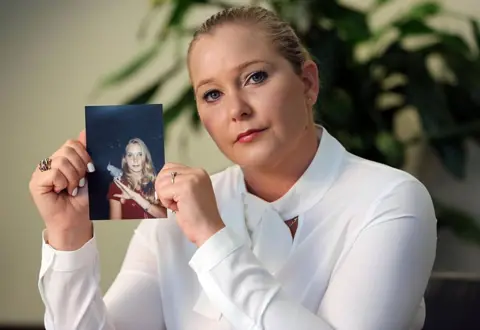 Getty Images
Getty ImagesLater in the book, Ms Giuffre touches on her 2022 out-of-court settlement with Prince Andrew after she brought a civil case against him.
"I agreed to a one-year gag order, which seemed important to the prince because it ensured his mother's Platinum Jubilee would not be tarnished any more than it already had been," she writes.
While Ms Giuffre's alleged interactions with Prince Andrew have been widely reported by the British press, the book's content is wider in scope - littered with sinister details of Epstein's sex trafficking.
The girls were required to look "childlike", Ms Giuffre says, and her childhood eating disorder was "only encouraged" under Epstein's roof.
"In my years with them, they lent me out to scores of wealthy, powerful people," she writes.
"I was habitually used and humiliated - and in some instances, choked, beaten, and bloodied.
"I believed that I might die a sex slave."
Epstein was convicted in Florida in 2008 for soliciting prostitution from a person under the age of 18. He died in 2019 while awaiting trial on sex trafficking charges.
On Sunday, the Metropolitan Police said it was "actively" looking into media reports that Prince Andrew tried to obtain personal information about Ms Giuffre through his police protection officer (PPO).
According to the Mail on Sunday, the prince asked the officer to investigate Ms Giuffre just before the newspaper published a photo in February 2011 of her first meeting with the prince.
A royal source told the BBC there are currently no plans for the removal of the prince title that Andrew was born with.
"The headlines are taking a lot of oxygen out of the royal room," they added, referring to press about Prince Andrew diverting attention away from King Charles's engagements.
In 2019, the prince repeatedly told BBC Newsnight that he did not remember meeting Ms Giuffre "at all" and that they "never had any sort of sexual contact."
Buckingham Palace has not commented.


Sign up here to get the latest royal stories and analysis every week with our Royal Watch newsletter. Those outside the UK can sign up here.

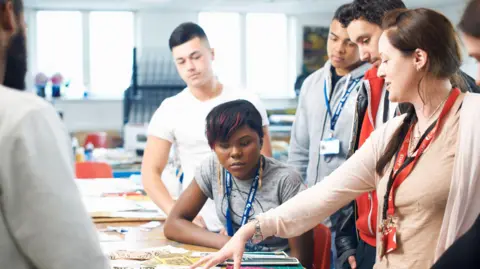 Getty Images
Getty ImagesNew vocational courses called V-levels will be rolled out for 16-year-olds under government plans to simplify a "confusing landscape" of qualifications in England.
They are set to replace Level 3 BTecs and other post-16 technical qualifications.
Ministers also plan to reduce the number of teenagers resitting maths and English GCSEs by introducing an alternative qualification.
The Sixth Form Colleges Association warned that V-levels may not fill the gap left by BTecs.
Ministers are expected to lay out proposals for higher education funding, including university tuition fees, on Monday afternoon.
The government has launched a consultation on its V-level plans, which form part of its post-16 education and skills white paper.
They come after Prime Minister Sir Keir Starmer stressed the importance of vocational training, announcing a target for two-thirds of young people to go to university or study a technical qualification.
Lola Marshall, 17, hopes to do an apprenticeship after her health and social care extended diploma at Leeds City College, and said there wasn't enough discussion about vocational routes at school.
"Everyone always talked about university and no one ever really helped me decide whether I wanted to do university or an apprenticeship," she said.

 BBC/ Hope Rhodes
BBC/ Hope RhodesIt is not yet clear when V-levels will be introduced, how they will be rolled out, or which subjects will be on offer - although the Department for Education (DfE) gave craft and design and media, broadcast and production as examples.
Skills minister Baroness Jacqui Smith said V-levels aimed to simplify options for students.
"There are over 900 courses at the moment that young people have the choice of, and it's confusing," she said.
"[V-levels] will build on what's good about BTecs and other alternative qualifications - the ability to be able to work practically, the concentration on things that are going to lead to employment."
Students will still be able to study A-levels or T-levels after their GCSEs, or start an apprenticeship.
Ministers expect many will want to mix and match between A-levels and V-levels.
T-levels, introduced in 2020, already offer a technical route for students, but the initial findings of a government-commissioned review said they shouldn't be the only option, partly because of their high entry requirements.
Students study one T-level geared towards a specific occupation, whereas they might study three A-levels in different subjects.
Baroness Smith said T-levels therefore suited students who "really know that's what [they] want to do", while V-levels would be better for those who were less sure.
Plans to scrap BTecs have been under way for a few years, and campaigners have stressed the importance of students having an alternative to A-levels and T-levels.
Bill Watkin, chief executive of the Sixth Form Colleges Association, said students must be able to enrol on BTecs and other courses for the next two years.
"While the detail has yet to be established, there is a risk that the new V-levels will not come close to filling the gap that will be left by the removal of applied general qualifications," he said.
David Hughes, the chief executive of the Association of Colleges, said V-levels might bring more "clarity and certainty" to further education.
"We've seen before lots of attempts to raise the profile of vocational and technical learning – we've got to hope this time we get it right as a nation," he said.
Baroness Smith also said a new qualification would be introduced as an alternative to GCSE resits, helping students who "too often have been on this demoralising roundabout of taking exams and failing them".
In England, pupils who don't get at least a grade 4 in GCSE English and maths have to continue studying for it alongside their next course, and are expected to resit.
However, the resit pass rate is low and the policy has proved controversial.
The government said offering an alternative would "break down barriers to opportunity", because white working class pupils were twice as likely to need to resit than their better-off classmates.
Its white paper will also propose that teenagers are offered a choice of two "pathways" - one focused on study and one on work - which will set out which qualifications they'll need to achieve their goals.
Ministers are also due to set out plans for the funding of higher education in England, including setting university tuition fees.
Universities have expressed growing concerns about funding pressures after years of frozen tuition fees, with more than four in 10 universities in England believed to be in a financial deficit.
They say income from fees has failed to match rising costs, and there have been fewer international students - who pay higher rates - coming in to help make up the financial shortfall.
Prof Shearer West, vice chancellor of the University of Leeds, welcomed the fact that domestic tuition fees in England and Wales rose to £9,535 this year but hopes to see further change.
"We're being asked to do more research with less money and teach more students with fewer resources," she told the BBC.
"The only way that we can deal with a situation like that is really to cut our costs, which often means that we have to lose staff and you can see that happening across the sector."
Additional reporting by Branwen Jeffreys and Hope Rhodes

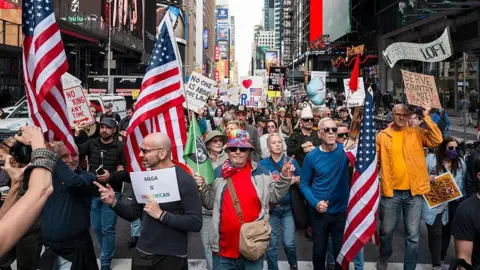 Getty Images
Getty ImagesThis weekend's "No Kings" demonstrations drew an estimated crowd of millions across the US to protest President Donald Trump's policies and his willingness to push the boundaries of presidential authority.
It was a moment for likeminded Democrats, liberals and some anti-Trump Republicans to rally together at a time when the American left has little formal power in national politics.
But where do they go from here?
By most accounts, the turnout at Saturday's events - in major US cities like Chicago, New York, Washington and Los Angeles, as well as hundreds of smaller towns – was higher than expected and surpassed the first "No Kings" rally in June.
Congressional Republicans had warned that the demonstrations would be "anti-American", and some conservative governors had put their law enforcement and National Guard on alert in case of violence.
The massive rallies turned out to be peaceful – a carnival, not carnage. In New York City, there were no protest-related arrests, and the gathering in Washington DC featured families and young children.

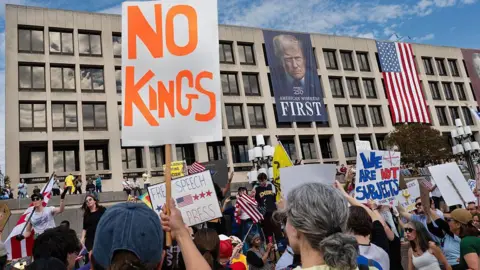 LightRocket via Getty Images
LightRocket via Getty Images"Today all across America in numbers that may eclipse any day of protest in our nation's history, Americans are saying loudly and proudly that we are a free people, we are not a people that can be ruled, our government is not for sale," Senator Chris Murphy of Connecticut said in his speech to the Washington DC rally.
Just down the street from the No Kings gathering in the nation's capital, the White House responded to the protests with derision.
"Who cares," deputy press secretary Abigail Jackson wrote in response to multiple media inquiries about the marches.
Trump shared several AI-generated videos on his Truth Social website of him wearing a crown, including one where he was flying a jet that dumped what appeared to be human waste on the protesters.
While Republicans may be downplaying the significance of the marches, the scale of the turnout – along with Trump's net negative approval rating in major opinion polls - hints at a Democratic opportunity to rebound from last year's electoral defeats.
The party still has a long way to go, however.
Polls suggest only a third of Americans view it favourably - the lowest for decades - and Democrats are divided over how to mount an effective opposition to Trump when they no longer control either chamber of Congress.
Liberals took to the streets on Saturday for a variety of reasons. Trump's aggressive immigration enforcement, his tariff policies, his government cuts, his foreign policy, his deployment of National Guard in US cities and his norm-breaking use of presidential authority were all frequent topics of concern and outrage.
Some of the frustration was also directed at Democratic leaders.
"We're just taking it on the chin, and we're not speaking out," one march attendee in Washington DC told NBC News on Saturday. "You know, I think we need to throw some more elbows. Unfortunately, the high road doesn't work."
The Democrats have been more combative over the ongoing government shutdown, which is about to enter its fourth week. They have been unwilling to approve a short-term extension of current federal spending without a bipartisan agreement to address health-insurance subsidies for low-income Americans set to expire at the end of the year.
Because of Senate parliamentary rules, Democrats have some power despite being in the minority – and, at least so far, the public seems to be assigning at least as much, if not more, blame for the impasse to Trump and the Republican majority.
But the strategy comes with risks too. The pain from the shutdown – particularly for those in the Democratic coalition – is only going to increase as the weeks go by.
Many federal workers have missed paycheques and are facing financial hardship. Funding is expected to run out for low-income food support. The US judicial system is scaling back its operations. And the Trump administration is using the shutdown to order new cuts to the federal workforce and suspend domestic spending, targeting Democratic states and cities.
The reality is that Democratic leaders in the Senate will ultimately have to find a way out of the crisis. But they may be hard-pressed to reach terms that the protesters who took to the streets on Saturday will find acceptable.
"If we shake hands with President Trump on a deal, we don't want him then next week just firing thousands more people, cancelling economic development projects, cancelling public health funds," Democratic Senator Tim Kaine of Virginia said on Sunday in an interview on NBC's Meet The Press. "So we are trying to get an agreement that a deal is a deal."
There is a chance the government shutdown will still be happening in early November when voters in some states will head to the ballot box for the first time since last year's presidential contest.
Elections for governor and state legislatures could provide a barometer for whether the anti-Trump sentiment on display at the "No Kings" protests translates into electoral success for Democrats.
Four years ago, a Republican won the governor's race in Virginia, an electoral battleground that has trended left in recent presidential elections, providing an early sign of voter dissatisfaction with President Joe Biden. This time around, the Democrat – former Congresswoman Abigail Spanberger – is leading her Republican opponent in the polls.
While Trump lost New Jersey in last year's presidential election, the margin of defeat - less than 6% - was dramatically down from Biden's 16% victory in 2020 and Hillary Clinton's 14% margin in 2017. November's governor's election shows a similarly close race.
At the No Kings rally in Montclair, New Jersey, Democratic National Committee Chair Ken Martin urged attendees to vote in the upcoming election.
"It is one thing to show up at these protests," he said. "And it's another to move the needle and get back some power."
This November's elections will be a test of whether antipathy toward Trump is enough to get left-wing voters to support Democratic candidates.
They are, however, just a prelude to next year's midterm elections, which will decide which party controls both chambers of the US Congress and could provide Democrats with a real check on Trump's power for the last two years of his presidential term.
The priority at Saturday's protests was to unite around a Stop Trump message. Of less concern, at least for the moment, was what Democrats could do once they get back to power.
There have, however, been some indications that cracks remain within the party coalition.
Former Vice-President Kamala Harris's book tour, for example, has regularly been interrupted by pro-Palestinian protestors who object to the Biden administration's Middle East policies. Centrist proposals to focus on economic issues over social policies – including trans rights – have prompted condemnations from many on the left.
Maine, Massachusetts, California and Michigan are likely to have contentious primary battles to determine Democratic nominees in next year's elections – pitting older establishment politicians against younger candidates and liberals against centrists.
These battles could quickly open old political wounds that are hard to heal. In that case, marches alone may not be enough to solve what has ailed the party.